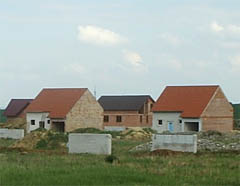
Experts welcome the amendment to the construction law, ecologists protest
 |
"The original intention to overcome the consequences of the previous political regime and open decision-making processes to the wider public has turned against the matter itself," said Jiří Plos, a teacher at the Faculty of Architecture of the Czech Technical University in Prague. According to him, the rules were set very imperfectly and broadly from the very beginning, allowing participation from essentially an unlimited range of various associations, which often arise ad hoc solely to prevent a specific construction project. "Behind the protection of nature and landscapes often hide private interests that would otherwise not be able to be enforced. The public's intervention has thus opened up a very private space," Plos added.
Renáta Pintová Králová, a member of the Czech Society for Construction Law, stated that even with the new regulation, the possibilities to protect the interests of nature and the public would be sufficiently broad. Czechia would also move closer to European standards. "Today, an association can become a participant in the building proceedings even from the other end of the country, without any relationship to the assessed project. Moreover, it can even be established during the proceedings. The position of civic associations has also been completely inadequately strengthened by judgments from administrative courts, which always unequivocally acknowledge participation to civic associations," Pintová Králová added.
According to environmental organizations, the amendment in the parliamentary version, namely in the part amending the law on the protection of nature and the landscape, newly does not allow associations to participate in zoning and building proceedings. "In practice, it is precisely the associations that are the only option for local citizens to express their opinions on buildings or the felling of trees in their vicinity. Individual citizens cannot participate in the proceedings unless they own land in the immediate vicinity of the building," the organizations state. Among them are Green Circle, Hnutí duha, Hnutí Brontosaurus, and the Czech Ornithological Society.
"The result of the parliamentary vote is a fiasco that the Senate, we hope, will correct. Not only would the adopted wording not shorten the approval deadlines by a single day, but it would also take away people’s ability to monitor whether constructions in their vicinity are done meaningfully and according to regulations," added Vojtěch Dědek, head of the legal advisory service Frank Bold.
Today, the Chamber of Commerce called on senators to approve the amendment to the Building Act. "When approving such an important norm, it is necessary to perceive the construction sector also in the broadest context. Statistics from the OECD and the World Bank show that Czechia is far below the European average in the length of approval procedures and construction implementation. Inefficient rules thus unjustifiably reduce our country’s competitiveness on the international stage," stated legal expert of the Chamber of Commerce Markéta Schormová.
The extensive amendment to the Building Act and several dozen related laws aims to simplify and expedite approval procedures. Among other things, it will allow the combining of zoning proceedings, building proceedings, and environmental impact assessments (EIA).
The English translation is powered by AI tool. Switch to Czech to view the original text source.
0 comments
add comment
Related articles
0
01.01.2019 | Last year, four kilometers of new highways were completed
0
08.10.2018 | The new building law should be effective in spring 2023
1
18.09.2017 | Šlechtová will start preparing the draft framework of the building law
0
13.07.2017 | Zeman signed the construction law, which will speed up the approval process
0
28.06.2017 | The Chamber confirmed its version of the amendment to the construction code
1
17.05.2017 | <content>Ombudsman criticizes the proposed amendment to the Building Act</content>
0
04.04.2017 | <Hospodářská komora prosazuje schválení novely stavebního zákona> translates to <The Chamber of Commerce advocates for the approval of the amendment to the building law>
0
14.03.2017 | The coalition experts will still negotiate about the construction amendment
0
07.03.2017 | Babiš: It is nonsense for five ministries to comment on construction projects
0
16.01.2017 | Šlechtová: I will propose to withdraw the non-functional amendment to the building act
0
16.11.2016 | The committee suspended the discussion of the amendment to the building act
0
21.09.2016 | The government today approved an amendment to the building law
0
13.09.2016 | The government today suspended the discussion of the amendment to the building Act
0
18.04.2007 | The ministry wants to amend the new construction law
2
10.04.2006 | Klaus signed the construction law, which will ease the process for builders






